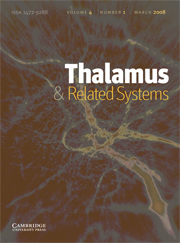Article contents
Effects of acute amphetamine in the mediodorsal nucleus of the thalamus: possible relevance for psychiatric disorders Amphetamine administration alters thalamic activity
Published online by Cambridge University Press: 12 April 2006
Abstract
Disruptions in the thalamocortical circuit have been related to several psychiatric disorders, such as schizophrenia and obsessive-compulsive disorders. The dopaminergic/GABAergic afferents to the limbic thalamocortical circuit originate in the ventral tegmental area (VTA) and play a crucial role in the regulation of the normal cognitive functions mediated by this circuit. Moreover, it has been shown that the dopaminergic modulatory system is altered in schizophrenics. Despite the strong clinical and behavioral evidence of the importance of the thalamocortical circuit and the mesocortical dopamine (DA) system for normal cognitive function, little is known about the basic synaptic interactions between the thalamus and VTA. This research hypothesized that VTA stimulation would evoke DAergic and/or GABAergic-mediated responses in the MD thalamic neurons. Using intracellular recordings in vivo, it was found that VTA stimulation evoked short latency EPSPs in 73% of the recorded MD neurons and IPSPs-like responses in 16% of the MD cells. The nature of the VTA-MD projection was explored using DAergic and GABAergic drugs. It was found that the indirect DAergic agonist amphetamine affects the spontaneous and VTA-mediated responses recorded in the MD thalamus. These results indicate that the VTA projection contributes to the modulation of MD activity and that the disruption of such modulation may be relevant in neuropsychiatry disorders.
- Type
- Research Article
- Information
- Copyright
- 2002 Elsevier Science Ltd
- 1
- Cited by




